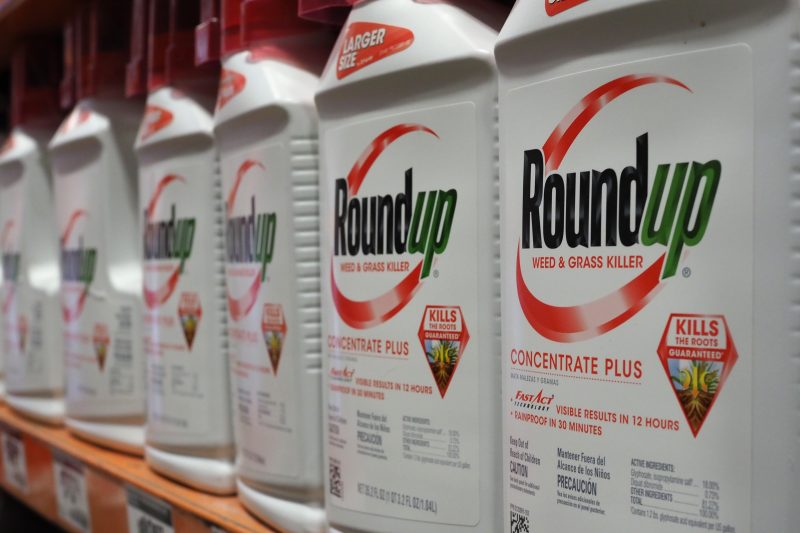Roundup weed killer contributed to man’s cancer, 1st US federal trial told
Monsanto has argued the products are not dangerous if the conditions of use are followed, and says hundreds of scientific studies prove this (Robyn Beck)
San Francisco (AFP) – The controversial weed killer Roundup was a “substantial factor” in the cancer of a US man who woke up one day with a lump in his throat and was soon diagnosed with non-Hodgkin’s lymphoma, his lawyer said Monday, opening the first US federal trial of its kind.
Edwin Hardeman, of Sonoma County north of San Francisco, filed a complaint against Roundup’s manufacturer Monsanto in early 2016, a year after being diagnosed with the cancer.
His is the first case to be heard in a US District Court but follows the groundbreaking case last year of Dewayne “Lee” Johnson.
Jurors in a California State Court last August unanimously found that Monsanto acted with “malice” and that its weed killers Roundup and Ranger Pro contributed “substantially” to Johnson’s terminal illness.
Roundup, a brand owned by German chemical and pharmaceutical giant Bayer after its purchase of US-based Monsanto last year, contains glyphosate that environmentalists and other critics have long maintained leads to cancer.
Glyphosate is used in weed killers made by several companies, and is currently the most used herbicide around the world.
Hardeman used Roundup extensively to treat his property from the 1980s until 2012. One of his lawyers, Aimee Wagstaff, told the court he would put the concentrate into a two-gallon (7.5-liter) pump, dilute it with water and then spray.
“On Christmas Day 2014 he wakes up and feels this lump in his throat,” Wagstaff said. “He goes to the doctor the next day.”
He was diagnosed in February 2015 with the cancer, the same type as that of Johnson.
Beside the lawyer sat Hardeman, 70, his features drawn and wrinkled, with brushed chestnut hair and a sparse white beard.
A screen in the courtroom showed a picture of Hardeman’s throat, with the tumor visible. In another photo he is smiling with his wife Mary in front of the ocean.
– Hundreds of similar cases –
Another image showed a Monsanto factory.
The first phase of the four-to-five week trial is to determine “whether the Roundup caused the plaintiff’s cancer,” District Judge Vince Chhabria said.
Wagstaff argued that “the more you are exposed to Roundup, your risk increases,” and that other components of the herbicide “are more toxic than glyphosate alone.”
If the jury later agrees that Roundup contributed to Hardeman’s illness, the next step will be to decide whether or not Monsanto has a liability.
The plaintiff’s lawyers argue that the company concealed the risks.
Monsanto, which has sold Roundup worldwide for more than 40 years, contends the products are not dangerous if the conditions of use are followed, as proven by hundreds of scientific studies.
Jurors in the earlier Johnson case last August ordered Monsanto to pay $250 million in punitive damages along with compensatory damages and other costs, bringing the total award to nearly $290 million.
Judge Suzanne Bolanos later denied Monsanto’s request for a new trial but cut the damages to $78 million to comply with a law regarding how such awards must be calculated.
The ruling sent Bayer shares tumbling on fears that a wave of costly litigation could be about to break on the firm.
In November, Bayer said it would slash 12,000 jobs in a restructuring after the takeover of Monsanto, which asked a US appeals court to toss out the Johnson verdict.
Hardeman’s is the leading case in a multi-district litigation of hundreds of similar cases which are legally linked, but will be heard separately.
Although not a class action lawsuit, the outcome of the Hardeman case will provide a signal for the other jurisdictions.
Praised by farmers for its effectiveness and low cost, glyphosate is under particular scrutiny in Europe and especially in France, where authorities in January banned a form of the herbicide, Roundup Pro 360.
Disclaimer: This story is published from a syndicated feed. Siliconeer does not assume any liability for the above story. Validity of the above story is for 7 Days from original date of publishing. Content copyright AFP.


